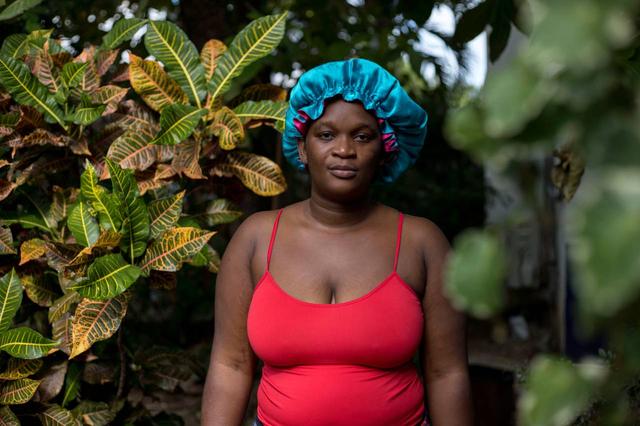Migration
Since the end of November, nearly 2,000 migrants from Haiti have arrived in Quintana Roo and have met with a lack of interest from state and municipal governments. Without temporary shelters and only two addresses for migrant care, civil society has avoided a humanitarian crisis, warn specialists
Text: Ricardo Hernández / Footer
Photos: Pamela Berlanga
“You're a bad-paid asshole. Do you know what it means to be an asshole? Being a bad person." This is the threatening audio received by Abdias Providence, a Haitian migrant. They demanded the payment of rent for a room that they tricked him into in Leona Vicario. It is a poor town far from the city of Cancun, where he arrived a week earlier in search of a humanitarian visa.
The woman in the audio had appeared at the offices of the National Migration Institute (Inami) to offer work, accommodation and support to Haitians who regularize their situation. Abdias enthusiastically accepted… until the threats began.
Concerned for his integrity, and those of his wife and one-year-old daughter, Abdias asked the Leona Vicario Public Security Command for help on Monday, December 27. He requested to contact staff from the United Nations High Commissioner for Refugees (Acnur) because he, he intuited, would help him.
The family was already exhausted from having left Brazil, crossing Central America for more than a month, traveling the last 1,400 kilometers to Cancun.
At 2:32 p.m. that day, Montserrat Alviso, UNHCR field officer, accompanied by a patrol, arrived at Calle Ardilla; They stationed themselves on the dirt road and in front of the wooden and iron gate surrounded by vegetation to pick up the family, which she moved to Cancun.
"You have to be careful, officer, I'm worried it could be a matter of trafficking or something else," Alviso ventured before leaving.
On December 5, in a solemn act, the governor of Quintana Roo, Calos Joaquín, and the Inami delegate in Quintana Roo, Verónica García, signaled the start of the Vacation Security Plan. The objective: to guarantee peace for the hundreds of thousands of tourists that they would receive in the December season, an incentive for the state economy.
In contrast, the event did not mention any special measures in light of the wave of migrants that began at the end of November. Nearly 2,000 Haitians have arrived in the entity, according to data from Inami, but have been met with a lack of interest from the state and municipal governments, who have not installed temporary shelters or have windows, units or addresses for migrant care – except Solidaridad and Chetumal. , and that keeps them in a vulnerable state.
At an express question, Lucio Hernández, state secretary of Public Security (SSP), assured this Wednesday that they had no record of any incident involving migrants. This excludes incidents such as that of Abdiel, the one that occurred in the temporary shelter set up in a church located next to the Multiplaza Kabah, where a Haitian woman was threatened with a knife by her compatriot and other similar ones.
According to researcher Martha García Ortega, from El Colegio de la Frontera Sur (Ecosur), it is urgent that the state and municipalities address the situation.
Civil society assists migrants
Faced with the inaction of the authorities, organized civil society, a church and UNHCR have tried to fill the institutional vacuum.
It's the last Thursday of 2021, a sunny day and New Year's Eve. Behind a wooden desk, placed outdoors and serving as an office in this makeshift temporary shelter set up at the Kukulkan College in Cancún, is Iván Ruiz. The Human Resources manager of Café Antoinette, one of the busiest, interviews Haitians Joselin Bien, Duramen Dieujuste, Fadner Pompilus and Stanley Doirin, aged 45, 30, 35 and 33, respectively, for work.

The shelter was set up by activist Mariana Escalante and her daughter, Mariana Bracho, on December 20, with the support of the family of Julián Ramírez, owner of the school, and a handful of volunteers.
Sitting at small and cramped desks, the four interviewees attend to the recruiter.
—What did you do before you came here? Ivan asks Joselin.
—He was a firefighter
—Firefighter, really?
"Yeah," he smiles.
—How many people are you coming with?
—It's me, my wife and daughter.
—Would your wife also work?
—Yes.
—And who's going to take care of the baby?
Joselin smiles again, now embarrassed, and replies that they would try to work different shifts to alternate care.
—Well, what do you want to work on?
—Whatever —solve.
I don't know how to get people to stop with the MisandryLOL jokes or respond to assertions that people should get t… https://t.co/KtdfCexMUA
— Hannah Erroneous Tue Jul 27 02:52:32 +0000 2021
And the interview continues. Iván explains the line of business and the labor needs of the business and at the end he offers them 5,250 pesos a month as base salary, plus 500 average tips. And the migrants agree, agree to give their data, contained in their recently processed humanitarian visa, and agree to accompany them to the corporate offices to sign the contract.
Mariana Escalante reveals a smile that hides her tired face for a moment, not so much because of the wear and tear of managing a shelter almost alone, but because of the congestion that could not be treated due to lack of time to attend to her health .
“We've got everyone a job!” he announces.
And it is that, in addition to having made it possible for Café Antoinette to be interested in hiring these four people, Mariana, after exhausting efforts, has obtained employment for nearly 40 migrants in the Majestic and RIU hotels, and with some friends from Cancun, Mexicali and Guadalajara, thanks to which they will have income to be able to rent rooms, resettle and, eventually, send money to their relatives.
That's the ambition of James Norseu, now a Majestic employee, who has two brothers and their mother in Haiti who depend on remittances. After six years of living in Chile, James, 32, left that country in August 2021, hoping to find a better life in the north; He traveled with his wife and daughter for a month and a half by land until they reached Tapachula, Chiapas, where they found the Inami offices packed. He spent three months without getting a humanitarian visa. From there, the agency transferred him on December 17 to the federal Delegation in Cancun, where he quickly obtained his visitor's card, which allows him to spend a year in the country and obtain CURP and RFC to be able to work. James had spent four nights on the streets of the city until Mariana offered him lodging.
The first day the temporary shelter opened, 40 Haitian adults and 18 boys and girls arrived, which last Wednesday increased to a total of 71.
Mariana and the small group of enthusiasts have not only facilitated the employment of migrants, but they have also obtained a doctor to do basic assessments of the users and have even managed to create a small community where migrants can spend the night, cook and leave their belongings, without feeling threatened.
In the early days, the room they use as a warehouse emptied quickly. The migrants took several pieces of soap, diapers, cans of food and even raw potatoes, given the uncertainty of their future. “There were people who took potatoes to their rooms. I asked why they were taking them, that they didn't, that the warehouse would be open all the time and that they could take what they needed whenever they wanted”, says Mariana. Today there are 62 and a half potatoes in a crate full of fruits and vegetables and a warehouse overflowing with basic necessities and donated clothing, which they now separate so that they can sell them in a bazaar that they already organize, in order to obtain more resources.
Urban artists and even revelers have also arrived at the shelter to entertain migrants.
“Colás, Colás, Colás and Nicolás / How much I love you and how badly you pay me / If you want, if you can, if not, you will tell me / Oh, how beautiful Nicolás's wife dances!” , sing Rafael Contreras, alias “Rafandango”, and Charly Solís, with their second jaranas, the son jarocho that adults and children enjoy.
Due to the imminent return to school, Kukulkan School will only be able to offer shelter until January 2. The school will have to be emptied. Users and migrants who continue to arrive will only have the option to spend the night, the shelter that a church improvised, located next to the Multiplaza Kabah, where until last Wednesday there were already 15 Haitians, but where there are no personnel to monitor and manage , where no donations have arrived and where there has been at least one security incident.
Flor Ruiz, technical secretary of the Cancún City Council, in charge of the governance of the municipality, avoided an interview with this medium to answer about the inaction of the authorities.
It is worth noting that both UNHCR representatives and civil society have held meetings with the Morenista "Mara" Lezama, mayor of Cancun, to request the installation of a temporary shelter, as well as an institutional response to the emergency, without any success.
Acnur tests a project in the southeast
Given the massive arrival of Haitian migrants, the Acnur and the International Organization for Migration (IOM), together with the government of Mexico, implement a pilot project that seeks to stabilize them and, eventually, integrate them into the national territory.
Some Haitian families who are in southern Mexico may be part of UNHCR's Local Integration Program, with which their relocation to cities in the center and north of the country is planned, "where they have better opportunities to access the market employment, housing, health and education.
Monserrat Alviso, UNHCR field officer in the Yucatan Peninsula, is in charge of the program in the region.
This universe is provided with medical, educational, labor, and lodging accompaniment; They are given support for that, one year of integration.
The Program, however, has not been able to meet the desired goals, since only 40 percent have stayed in the city where they have been transferred, found work and a home.
“Why? It has nothing to do with what we got for her or not, but with a need to move on her own, ”replies the officer.
In Cancun, UNHCR has integrated 35 family and individual cases into the Program.
Acnur also provides sporadic support, such as the case of Abdias, the migrant he rescued from Leona Vicario, who was helped with two-day lodging in a hotel in downtown Cancun, monetary support, and guidance to find a job .
In total, Alviso calculates, the international organization has assisted 1,356 Haitian migrants in the Yucatan Peninsula since last November 26.
On the other hand, Alviso points out the institutional challenges in Quintana Roo. It is necessary, he comments, migrant service windows in the Town Halls, in addition to municipal units or addresses. There is also an urgent need, he says, for a single window in the SAT for attention to migrants, in order to expeditiously process the RFC, which will expedite and help their integration into the formal labor market.
After three days of touring various neighborhoods, Alviso identified a house for rent, accessible to three Haitian families in Superblock 67 in Cancun.
This Thursday he transferred two of the family members to review the facilities, who were interested in the offer and will soon begin the move.
Without the work of organizations, the crisis would worsen
For the social anthropologist Martha García Ortega, the work of international organizations and civil society has been key in reducing the problems derived from migration .
García Ortega emphasizes that Quintana Roo is one of the states with the highest population growth due to internal and foreign immigrants. Its main characteristic, he points out, is internal mobility, since just under a million people residing in this state were born inside the Republic and it has close to 40 thousand people born in another country. "Faced with Chiapas, this is revealing because at that end of the border the foreign population exceeds 60,000 people, and national immigration is much less," he comments.
And despite this, he criticizes, the entity has institutional lags in the matter; it is not prepared to attend temporary migration.
“On the other hand, the government has ignored and excluded other contingents such as construction workers, women who work in hotels, who settle in precarious conditions and who come here looking for work. In fact, one can be emphatic: if the southern border does not accept and manage international migration in this humanitarian crisis, it will not be prepared for the Mayan Train," he says.
***
This text was originally published in Footer:


